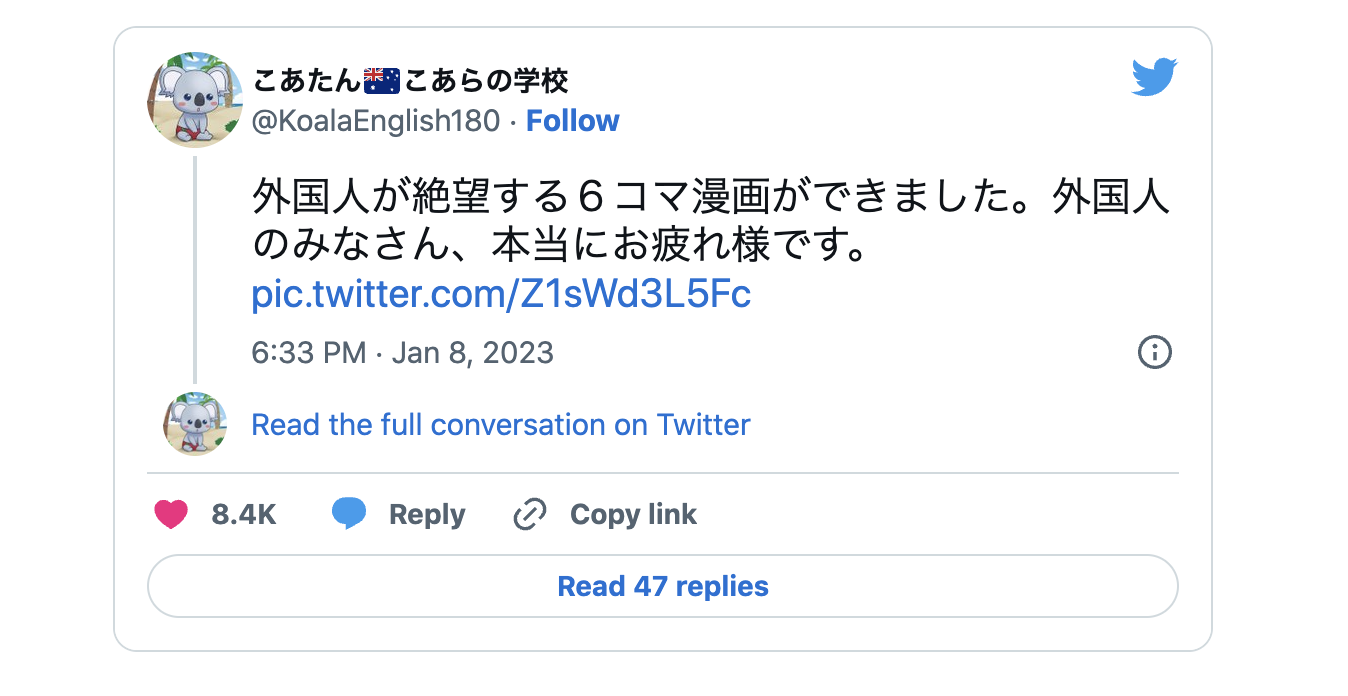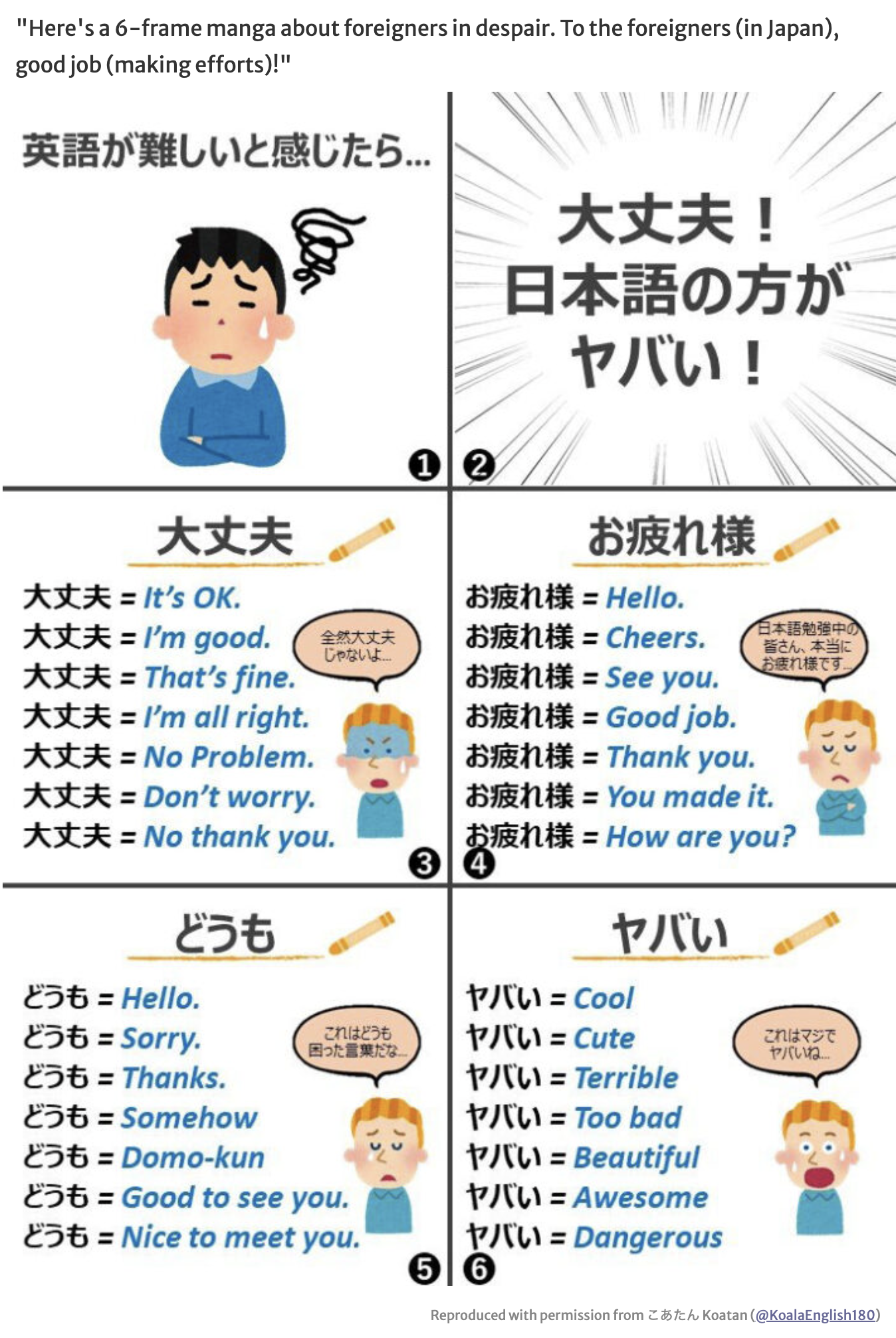Japanese Twitter user こあたん Koatan (@KoalaEnglish180) regularly posts illustrated English learning tips gleaned from his daily experiences living in Australia.
One of his recent posts, however, diverged from his usual style. Instead of focusing on Japanese people learning English, it focused on native English speakers learning Japanese. In the first two panels, he says: "If you think English is hard...Don't worry. Japanese is more terrible!" Then, he introduces four Japanese expressions that each have multiple meanings.


Koatan is playing this for humor, seeking to make his readers feel better by suggesting that their struggles in learning English can't compare to what non-Japanese speakers go through when they try to learn their language.
However, his argument is premised on the notion that all learners prefer a one-to-one correspondence between the two languages when this is not necessarily the case.
In fact, having multiple meanings for a single expression can be rather convenient since it means you don't need to memorize multiple expressions and learn how to pronounce each one.
So then, let's take a look at these four expressions:
大丈夫 daijobu
大丈夫 = It's OK.
大丈夫 = I'm good.
大丈夫 = That's fine.
大丈夫 = I'm alright.
大丈夫 = No problem.
大丈夫 = Don't worry.
大丈夫 = No thank you.
Indeed, 大丈夫 is a very versatile word. You can use it to express approval, to confirm that you're OK with something your interlocutor said, and even to reassure them if they seem concerned about you. Moreover, just as "I'm good" or "I'm OK" can also be used to turn down an offer in English, 大丈夫 can be used for the same purpose.
Is a waiter worried that you won't be able to handle the spice level of the ramen you ordered (with a few notable exceptions, the spice level for Japanese food is usually mild compared to other countries, since most Japanese people have a relatively low tolerance for spicy food)? Daijobu! Would you prefer a knife and fork? (Holding up the chopsticks) Daijobu! Would you like to try some natto (fermented soybeans) with your rice? [Making the stop gesture and showing a slightly disapproving expression] Daijobu.
どうも domo
どうも = Hello.
どうも = Sorry.
どうも = Thanks.
どうも = Somehow
どうも = Good to see you.
どうも = Nice to meet you.
どうも = Domo-kun
どうも domo is probably one of the most versatile words in Japanese. Whereas the various meanings of daijobu don't vary too much from "I'm OK" or "OK" in English, domo can't be easily explained and has a truly remarkable variety of possible meanings. It can be used to show appreciation, apologize, and as a casual way of greeting someone. It's also an adverb, meaning "somehow," and yes, it's the name of the NHK mascot character, Domo-Kun.
If you're visiting Japan as a tourist, you'll find it handy when a stranger holds the door open for you, shows you the way, or does something nice for you. Just say domo, with a smile and a slight bow.
The next two expressions may be more useful for people staying in Japan for an extended period or those who have already learned some Japanese and have Japanese friends to practice with.
お疲れ様 otsukaresama
お疲れ様 = Hello.
お疲れ様 = Cheers.
お疲れ様 = See you.
お疲れ様 = Good job.
お疲れ様 = Thank you.
お疲れ様 = You made it.
お疲れ様 = How are you?
The phrase お疲れ様 otsukaresama is used among work colleagues, friends, and sometimes family members and acquaintances. While its etymology is derived from the verb 疲れる tsukareru, meaning "to get tired," it's used in any situation when there is reason to acknowledge someone's work or effort.
It's a fixed expression that colleagues say before they leave the office at the end of the day but it can also be used when you greet someone, knowing that they've traveled far or done something to prepare for the occasion.
ヤバい yabai
ヤバい = Cool
ヤバい = Cute
ヤバい = Terrible
ヤバい = Too bad
ヤバい = Beautiful
ヤバい = Awesome
ヤバい = Dangerous
This is the only slang expression among the four, so it's only appropriate among friends or close colleagues (and not your boss or a stranger). If you make a Japanese friend, it can be fun to use it in all kinds of situations, both positive and negative.
As you can see, these four Japanese expressions can be used in many different situations, some of which could come in handy when you're visiting Japan.
Instead of interpreting plurality of meaning as a negative, you can look at the positive side and consider it a plus.
Read more stories from grape Japan.
-- Noodles you don’t have to slurp–instant ramen flavored popcorn released in Japan
-- Build your own ‘Great Wave off Kanagawa’ with new Lego rendition of Hokusai’s famous print
-- How to really enjoy Golden Gai, a famous bar hopping haven in Kabukicho, Tokyo
- External Link
- https://grapee.jp/en/
 Take our user survey and make your voice heard.
Take our user survey and make your voice heard.















6 Comments
Login to comment
virusrex
A friend of a long time really likes the ヤバい expression, apparently because she considers it very different from the image she had of Japanese people, a word with lots of unnecessary emotions included without real need.
finally rich
ヤバい
ヤバいっす
ヤっべぇー!
ヤバくねぇ?
expression used by teenagers/people with very low intellectual ability
Strangerland
It's common lingo used by all kids. So your comment is pretty silly.
kohakuebisu
Those four English expressions mean essentially the same thing. They have one meaning, not four.
There is probably a very interesting conversation to be had involving cultural and linguistic differences between Japanese and English. However, articles like this and other ever popular ones like "Japanese has more colours than English" involve so much cherry-picking and superficial observations that they simply waste the readers' time. Instead of interesting discussion, we just a clickbaity statement to draw us in and then very little evidence to back it up.
Laguna
My wife often says いいよ, and I have to confirm: is that the "yes" いいよ or the "no thanks, I'm fine" いいよ.
Nicolò
On the contrary I find Japanese more convenient from his manga. You only have to lean less phrases to cover more. I also found that sometimes fractured Japanese sounded native cuz Japanese can omit many building blocks of the full sentences.